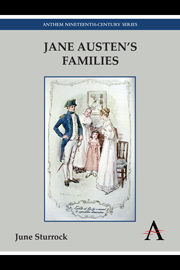Book contents
- Frontmatter
- Table of Contents
- Acknowledgements
- References and Abbreviations
- General Introduction
- Part I Family Dynamics
- Part II Fathers and Daughters
- Introduction
- Chapter Four Money, Morals and Mansfield Park
- Chapter Five Speech and Silence in Emma
- Chapter Six Dandies and Beauties: The Issue of Good Looks in Persuasion
- Conclusion: “Creative Attention”
- Notes
- Select Bibliography
- Index
Chapter Five - Speech and Silence in Emma
from Part II - Fathers and Daughters
- Frontmatter
- Table of Contents
- Acknowledgements
- References and Abbreviations
- General Introduction
- Part I Family Dynamics
- Part II Fathers and Daughters
- Introduction
- Chapter Four Money, Morals and Mansfield Park
- Chapter Five Speech and Silence in Emma
- Chapter Six Dandies and Beauties: The Issue of Good Looks in Persuasion
- Conclusion: “Creative Attention”
- Notes
- Select Bibliography
- Index
Summary
From its title-page – Emma: A Novel – and its first two words – “Emma Woodhouse” – on, Jane Austen's most perfect narrative focuses on one woman, confining itself almost entirely to Emma's own consciousness. Yet Austen's concern here is not with the individual consciousness in isolation but with the individual in the family as well as the larger community. Book I focuses on Emma in Hartfield, while the later books concern Emma both in Hartfield and in Highbury. As Jan Fergus writes, in Emma, “Highbury as a community takes centre stage” (Jane Austen 152). And the little town is imagined as closely and lovingly as any of its inhabitants, and perhaps plays as important a role in the novel.
In any small close-knit community such as Highbury, with its obligations, benefits and irritations, speech – communication – is central. Accordingly, Emma, more than any other of Austen's novels, emphasizes the significance of speech, not only through its brilliant dialogue, but also through an intense consciousness of speech habits and their implications. All Austen's novels show a sensitivity to idiolects. J. F. Burrows' studies confirm that “the evidence of stable differentiation between character and character, idiolect and idiolect, is far more pronounced than the evidence of variation within any one idiolect” (39). In Emma, this differentiation is especially striking, and this novel's characters and narrative voice alike pay more conscious attention to its implications. Miss Bates, Mr Elton, Mrs Elton, Harriet, Mr Woodhouse – all are recognizable every time they open their mouths, not just because of the content of their speeches but also because of the characteristic ways in which they express themselves – their various idiolects.
- Type
- Chapter
- Information
- Jane Austen's Families , pp. 85 - 98Publisher: Anthem PressPrint publication year: 2013



